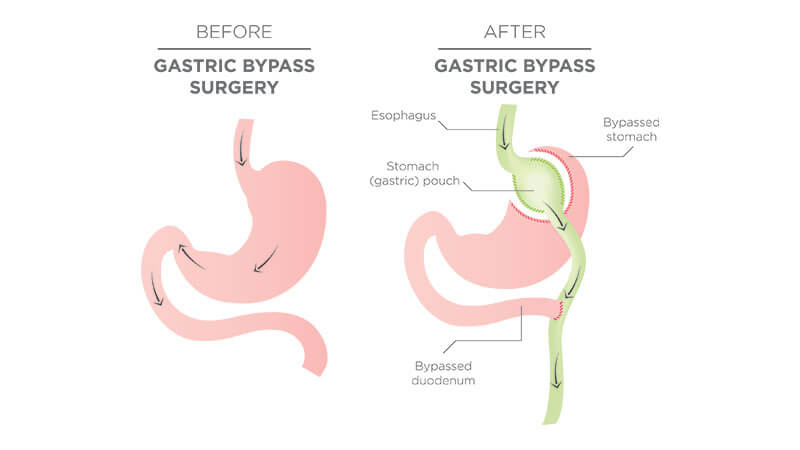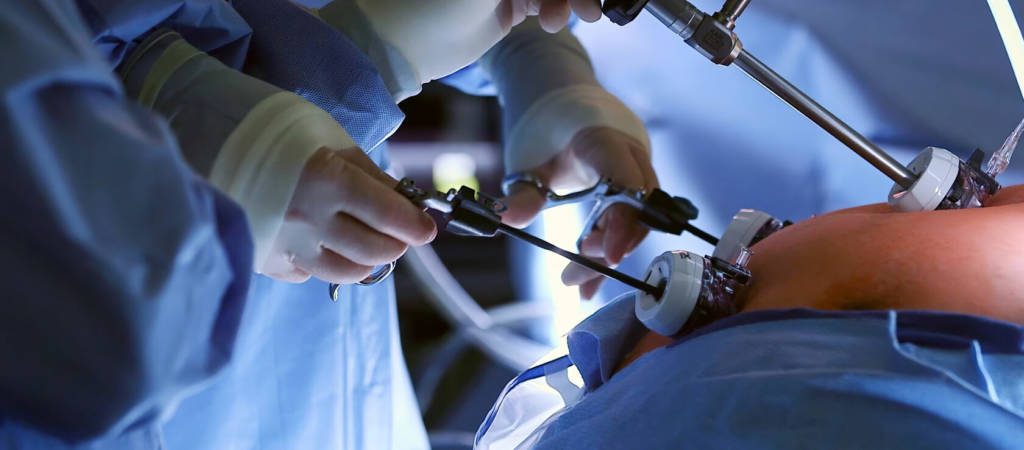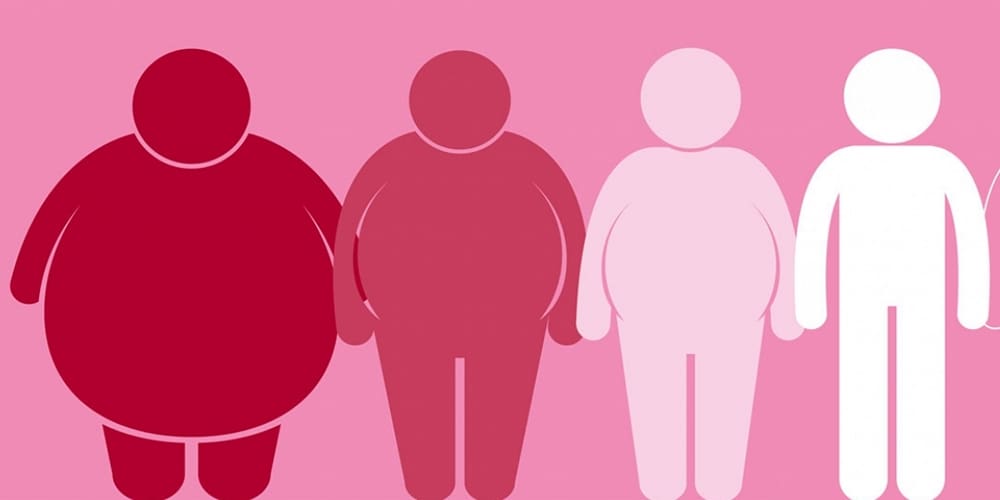The operation creates a small pouch in the stomach that is directly connected to the small intestine.
Weight loss after this occurs due to two effects:1) Impossibility to eat in large quantities. Once in a small bag, even a very small amount of food causes a feeling of satiety. As a result, there is a long-term decrease in appetite, and sometimes even a temporary aversion to food.
2) Malabsorption is the inability to absorb nutrients. Decreased appetite is not the only reason for weight loss after this operation. The fact that food passes by the stomach and duodenum leads to a decrease in the level of absorption of nutrients.

And especially fats, which are simply excreted from the body unchanged. This mechanism further enhances weight loss during Gastric Bypass surgery.
Weight loss with Gastric Bypass is on average 65 to 75% of excess weight. Primary weight loss is faster than with other bariatric surgeries – in about 12 months.
It also addresses health and quality of life problems associated with being overweight. These improvements usually show up long before maximum weight loss is achieved.
Gastric Bypass for pathological obesity:
Morbid obesity is a disease that often has many associated medical conditions and is associated with a significant reduction in life expectancy. Many of these can be reversed if sufficient and sustained weight loss is achieved.
The data suggest that for the majority of obese people, diet, exercise, and medications have a high failure rate and that bariatric surgery is the most effective long-term way to achieve significant weight loss in these patients.
The risks of a non-surgical approach to your morbid obesity are a very high failure rate of weight gain in the long run, leading to a higher risk of obesity-related medical conditions and reduced life expectancy.
Indications for the surgery:
In 1991, the National Institutes of Health (NIH) presented a consensus statement on patient selection for bariatric surgery. Patients are considered candidates for Gastric Bypass surgery if they meet one of the following criteria:

• BMI (Body Mass Index) > 40
• BMI 35-40 plus one of the following obesity-related comorbidities:
• Severe diabetes mellitus;
• Pickwick’s syndrome;
• Obesity-related cardiomyopathy;
• Severe sleep apnea;
• Osteoarthritis;
• Lifestyle incompatible with severe obesity.
To be candidates for Gastric Bypass, patients must have had a history of unsuccessful attempts to lose the desired amount of weight through controlled dietary changes. Patients should also follow a postoperative diet and exercise.
Contraindications for Gastric Bypass surgery:
• Alcohol or drug addiction;
• Serious mental disorders;
• Decompensated stages of chronic diseases of the kidneys, heart, liver.
It is important to understand that bariatric surgery is only a tool to solve problems with persistent obesity. Patients who do not seek long-term lifestyle changes may not be ideal candidates for this procedure.
Benefits of the procedure:
• Faster and more pronounced weight loss compared to other bariatric surgeries. The average loss in the first two years is 70% overweight.
• Consistent results in the long term. After 5-6 years after the operation, weight loss remains in the average range of 70-80% of the excess.
• Possible reversibility of the results of the operation with the restoration of physiological digestion.
• There are no restrictions on sports and the level of possible physical activity.
Bypass Risks:
• Complications associated with the operation, such as, for example, the formation of fistulas at the sutures.
• The need for lifelong intake of vitamins, minerals, and sometimes protein shakes as replacement therapy.
• Inability to take tableted non-steroidal anti-inflammatory drugs (NSAIDs).
• Forced refusal of combined oral contraceptives and a number of medicines in the form of capsules and tablets.
Gastric Bypass preparation and precautions:
- Pregnancy:
Pregnancy should be avoided in the first year after surgery. Periods of rapid weight loss are not suitable for trying to conceive or trying to maintain an existing pregnancy.
- Preoperative fasting:
To make your surgery technically safe, your surgeon may start with the Optifast diet at least two weeks before surgery. This is an ultra-low-calorie diet (800 kcal per day) with a predominance of liquid meals.

It is designed to shrink the liver and reduce the risk of surgical complications. It also introduces you to the liquid dietary regimen that you will need to follow in the post-operative period.
- Smoking:
Smoking increases the risk of lung complications and blood clots, regardless of the type of surgery. It is recommended that you try to quit smoking before surgery. Even quitting smoking a week before surgery can be helpful.
- Preoperative gastroscopy:
A preoperative gastroscopy is used to make sure that there are no other physical abnormalities that could interfere with the operation.
For patients undergoing Gastric Bypass, this is extremely important. Since the stomach will be divided and most of it will not be accessible, it is important that this part is examined prior to surgery.
- Other tests:
The doctor may order other tests depending on your condition – an ECG, a pancreatic ultrasound, a sleep apnea test, etc.
It is important to understand that after surgery, most of the stomach will not be accessible with traditional endoscopy. There will also be no access to remove gallstones with an endoscopic ERCP procedure. Access to the stomach or bile ducts will require surgery.
How is Gastric Bypass performed?

The operation takes place under general anesthesia. The procedure involves the creation of several small incisions through which laparoscopic instruments are inserted to perform the operation.
The surgeon then redirects your digestive tract to bypass most of your stomach and part of your small intestine. Although Gastric Bypass is performed as a laparoscopic procedure, you may need to stay at the medical center for up to two days after the operation.
During this time, an interdisciplinary team of surgeons, nutritionists and psychologists work together to make sure everything went well and your health allows you to safely leave the hospital.
Gastrointestinal recovery and side effects:
In the post-operative period, you may need time to determine how your new stomach behaves, and you may have problems with post-eating discomfort and occasional vomiting.
After a Gastric Bypass, there may be an intolerance to certain types of food, usually fatty foods, dairy products, or sweets.
This can cause unpleasant symptoms similar to seasickness:
• sweating;
• nausea;
• shake;
• abdominal pain;
• diarrhea that lasts from a few minutes to an hour.
This condition is known as “dumping syndrome”.
Some patients find this a beneficial side effect as it increases their inability to consume high-calorie foods.
Other possible side effects:
• Combined oral contraceptives (COCs) can no longer be fully absorbed and provide a contraceptive effect. Therefore, it is necessary to find another means of contraception after the operation.
• Anti-inflammatory drugs (aspirin, diclofenac, etc.) in any form are prohibited after Bypass surgery, as they significantly increase acid production and put the patient at risk of developing intestinal erosions and ulcers.
• Deficiency of vitamins and microelements. Gastric Bypass surgery leads to vitamin deficiencies, which can be corrected by lifelong vitamin supplementation. While this may seem overwhelming, keep in mind that Bypass surgery allows you to eliminate your daily intake of multiple medications.
What results can you expect?
Weight loss with Gastric Bypass surgery can be very rapid. You will quickly lose a large amount of weight in the first few months after Gastric Bypass.
Studies have shown that, on average, Gastric Bypass patients lose their appetite within the first five months after surgery.
During this period, it is important to take in the right amount of calories, proteins and vitamins so that you do not feel sick, weak and possibly lose some of your hair.

It is important that you follow the dietary recommendations given to you by your nutritionist. Your chances of achieving your weight loss goals are improved if you follow our bariatric program after surgery.
Your goal is to burn fat, not muscle, so you need to take protein to maintain muscle mass. The best chance of losing weight with Gastric Bypass surgery is in the first nine months.
Remember that the goal of surgery is to make you healthier, increase your life expectancy, and reduce problems caused by obesity-related diseases, not to reduce your weight below normal.
Benefits of choosing AgIstanbulHealth
Only top qualified doctors
JCI certificated hospitals
Free COVID-19 Test before departure
4 nights in a 5-star hotel in Istanbul
Costs for laboratory, medication and equipment
Pre/post-operative tests
Free Istanbul tours
Latest technologies
Excelent travel assistance
All-round VIP transfer
Credit / Debit cards accepted
No prepayment
Personal assistants speak in English
24/7 customer service

